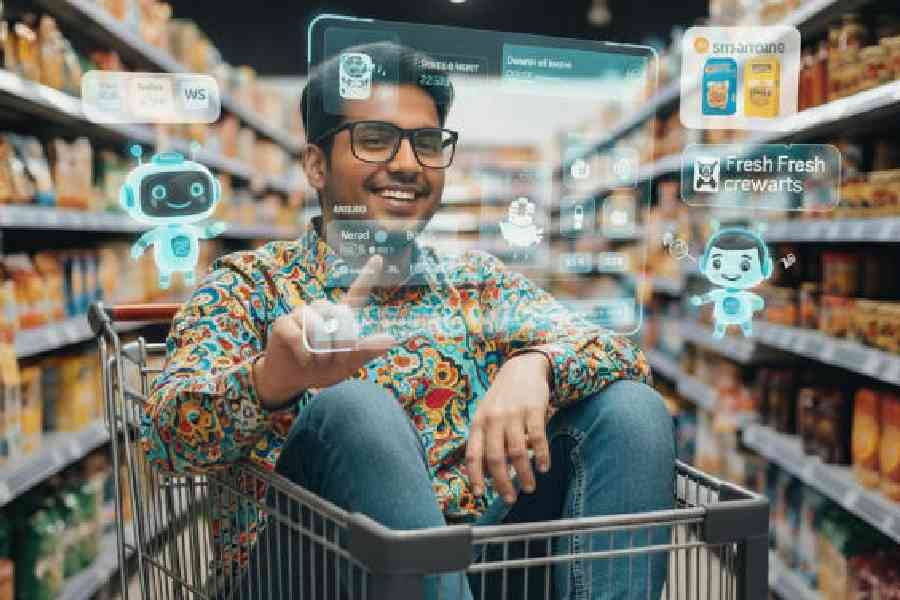The most time-consuming part of shopping for most of us is research. It involves poring through reviews, looking for better deals, and getting delivery dates right. And most of the shopping we do every month involves mundane things — floor cleaner, scrubs, rice, lentils, biscuits, pet food… you know the drill. With artificial intelligence picking up steam, the way we shop is changing. AI chatbots and AI agents are changing the game.
“I tell my wife that I could be spending 10 per cent of my life shopping. If an agent takes care of it, I would have more time for the family and whatever else I want to do,” said Sravana Karnati, EVP, Walmart Global Tech, when we met on the sidelines of Converge 2025 — Walmart Global Tech’s flagship retail-tech event in Bangalore.
Walmart is making sweeping, wide-ranging changes in the way consumers shop, search for products, and make products more appealing to us, as well as to AI agents that are evolving to assist us in our shopping journey. Nipping at the heels of large language models, AI agents are being talked about as the next big thing because of the appeal they hold: A digital assistant that can complete practical tasks, in this case, shopping. Of course, when it comes to a new dress from Zara, it holds enough appeal to do it in person.

Sravana Karnati, EVP, Walmart Global Tech. Picture: Mathures Paul
It’s even possible to have AI agents purchase on behalf of consumers. Realistically, where do we stand? “It has been evolving. If you look at when ChatGPT launched in November 2022, and then there was another major launch they did in February 2023, that really caught the imagination of everybody. Everybody saw the potential of what transformer technology could do, what ChatGPT could do. If you look at it in the last two years, how far we have come, the progress has been tremendous. It's hard to predict when exactly agents can autonomously do a task like go search (something) for me, add to cart, and then intelligently order. If you want to do it today, you could do it. It's not inconceivable to design such an agent and do it. Whether you would like it and will it meet all your personalisation requirements would be the question. It's hard to predict exactly when that agent will completely understand your buying patterns, your context in what's happening in your life, your life stage, and all of that. And not all of that is LLMs,” said Sravana before segueing into WIBEY, which he is passionate about.
Enter WIBEY
WIBEY is something new… it is Walmart’s engineering super agent. It’s an interface for anyone building, deploying, or operating technology at Walmart. It’s the foundation that allows the company to scale agents AI responsibly.
It can be used to search for what agents are available. Is it a platform that can be used to build agents and intelligent systems for other people to use? Absolutely. Is it a platform to safely experiment before deploying solutions? Sure.
“WIBEY, for example, integrates LLM technology, natural language technology, transformer technology, and then a whole bunch of other tools that are made available through MCP (model context protocol). Understanding one’s buying patterns and predicting what is the next thing that you might want, that's not necessarily LLM, that is other technology, and we're investing in that as well,” he said.
Explaining WIBEY, Sravana took a few steps back to highlight how developers work. They continuously try to simplify their work. “If I am a developer, doing something repeatedly, I write a script because I don't want to keep on executing that manually. And this has been going on forever, because there is so much to do, so that kind of automation has been happening.”
So there can be a library of solutions to problems, so Walmart teams don’t have to do things from scratch every time. Let’s call these solutions recipes. With generative AI, the ability to automatically create those recipes is also growing.
“When I need to create something, I go to what is called a DX (developer experience) portal and ask a bunch of questions. We have put in LLM in there to make it more powerful; the search is more powerful.” Walmart has been experimenting with generative AI for a few years now, but the conceptualisation of WIBEY began last year.
Product description is important
You may have heard about search changing. Instead of 10 blue links, you have different AI modes to tackle your queries. Shopping too is changing because the way consumers research products on search engines has evolved. It also means big names like Walmart need to be alert about the description of the products they stock because third-party AI agents are now coming to interact with their AI agents.
“One of the ways we are streamlining that is to make sure that we have the right attributes. And we have a standardisation of those attribute values. For example, I could be a seller who's putting in a product description for a particular item. And you could be another seller who is also adding the same product, but as something that you want to sell. I want to basically say this is the same product you can buy from these sellers. But to be able to do that, I need to recognise that the system needs to recognise that my product and your product are the same. So we look at some golden attributes… discover that the product is the same. And what we want to do is then we look at the attribute values, the strings, the text for each of the attributes… We have built capabilities that leverage large language model technology to go through all these items and normalise the descriptions, strengthen them, and then also be able to translate them, because we operate in more than one country. We need to get the search algorithms to get better and better and better, which is something that we've been working on, and we've had huge strides in that department,” said Sravana.
Exciting times ahead
He is excited about shopping in the future, even with all the changes. "It'll continue to change. I buy the same things again and again. Can Walmart know what's in my fridge? Can they predict it? And if they can predict it with accuracy, can they automatically send it to me? I don't even need to shop.”
He does 95 per cent of his grocery shopping from Walmart, and he is impressed by how well the Walmart app knows his history and how it suggests things.
“Hey, before you go, you might want to look at that. Or, hey, you know, there is a substitute available for some product I am looking for. All of these convenience attributes of the app are what I'm impressed by. So that is going to get better and better with more AI.”

Sravana Karnati with Daljeet Kukreja, group director, Walmart Global Tech, and Hema Rajesh (extreme right), director, Walmart Global Tech. At Converge 2025 in Bangalore. Picture: Mathures Paul
Coming back to the scenario of AI agents shopping on your behalf, it’s early days. Most commercially available agents come with the “experimental” disclaimer, like OpenAI describes its Operator as a “research preview”. A brief item description can be enough for Operator to go pottering online. It’s a glimpse of something that’s coming the way of a larger audience. And Walmart is ready for the future.
Sravana is sure WIBEY is ready to offer many of the solutions that Walmart will need in the AI era. “I think of this as a super agent. It's like a shell that brings a whole bunch of capabilities. So we are fast building this super agent that incorporates many capabilities.”










